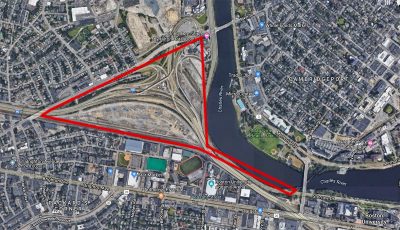
Massachusetts is one step closer to beginning construction on the massive Allston Multimodal Project, which will dramatically reshape the section of highway separating Boston University’s West Campus and the Charles River, the Massachusetts Department of Transportation announced Friday.
The Federal Highway Administration filed a “Notice of Intent,” which will initiate a mandatory environmental impact study that must be finished before construction can begin, according to a MassDOT press release. The current plan is for the elevated section of the Massachusetts Turnpike (1-90) behind West Campus to be demolished and replaced by a ground level highway.
Additionally, the section of highway that curves around an abandoned rail yard will be straightened to run closer to the BU Track and Tennis Center, according to the project’s website. A section of Soldiers Field Road will also be replaced by a viaduct that will run above the newly ground level section of the Mass. Turnpike.
Massachusetts Transportation Secretary Stephanie Pollack said in a press release that planning for Allston Multimodal Project began in spring 2014 in order to update the obsolete and aging Allston Viaduct, which carries the Massachusetts Turnpike (I-90) from the Allston Interchange to the Commonwealth Avenue Bridge.
“For more than four years, the Allston Multimodal Project has been the subject of intense public engagement and design development and I am pleased that we have reached this milestone with the publishing of the Notice of Intent,” Pollack said.
The rebuild will improve the livability and connectivity of the Allston neighborhood while also creating more open space in Allston and along the Charles River, making space for bicycle and pedestrian paths, according to the project’s website.
There are also plans for a new commuter rail station in Allston to be built between the BU Track and Field Center and the straightened highway, according to the project’s website.
Anthony D’Isidoro, president of the Allston Civic Association, said the rebuild is expected to have major benefits for the BU community.
“During the construction stage there would be a lot of work going on, so we would have to mitigate those construction impacts for students,” D’Isidoro said. “Hopefully, this will provide future connectivity to the river and greater bus service.”
D’Isidoro said BU students should be relatively unaffected by the construction.
“This has no direct construction on the campus itself,” D’Isidoro said. “It would eventually allow greater pedestrian access for the BU community. The bulk of the work would not be related to the campus.”
Currently, the project has to undergo an environmental impact test before construction can begin, according to the project’s website. Under the current timeline, construction is expected to begin in 2022, with the work taking anywhere from eight to 10 years to complete.
With that in mind, only current freshmen and sophomores would see the beginning of construction.
Sydney Aguirre, a freshman in the College of Arts and Sciences, said she thinks the project is a good idea.
“I appreciate that this project will eventually benefit BU while also not interfering with campus life,” Aguirre said.
Austin Woo, a senior in CAS, said while he will be leaving campus before construction begins, he supports the project.
“As a senior, this doesn’t really affect me, but I’m glad BU will hopefully benefit,” Woo said.
Allston resident Joe Poverchuk, 25, said he grew up in the neighborhood and said that he would have liked to see these improvements earlier.
“[Transportation] has always been hectic, it’s always been crazy. I could definitely see it helping,” Poverchuk said. “I’d love to see my hometown looking nice but it’s like, why is it that [after] all the lower-income families get pushed out of the neighborhood that we started to see that?”
Angela Yang contributed to the reporting of this article.























































































































Anand Mama • Oct 24, 2019 at 8:58 pm
Super write up ?